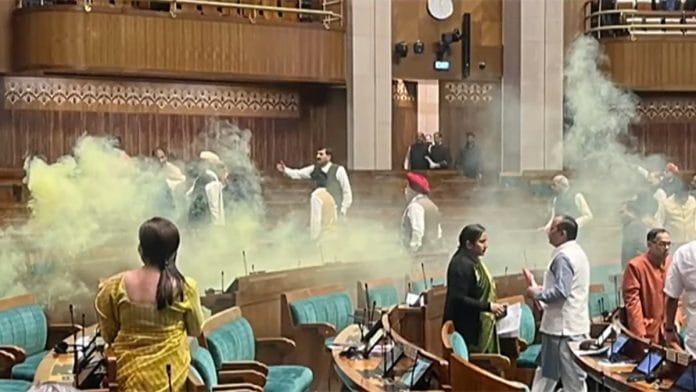Thank you dear subscribers, we are overwhelmed with your response.
Your Turn is a unique section from ThePrint featuring points of view from its subscribers. If you are a subscriber, have a point of view, please send it to us. If not, do subscribe here: https://englishdev.theprint.in/subscribe/
Physical security of a vital area comprises several tangible and intangible factors. With the proliferation of subversion by non-state actors, physical security is what a large portion of the uniformed services are involved in. In the current times of technological advancements, plethora of gadgetry, equipments etc are increasingly deployed towards an effective security arrangement. The technology has undoubtedly complemented and conserved the human efforts, thereby paying handsome dividends.
However, it has often been experienced that many of the vital areas / infrastructures suffer terror strikes, notwithstanding the sophisticated security cover. Such terror strikes are basically of two categories; firstly on the structures that do not have dedicated security cover such twin towers (9/11), Hotel Taj & other structures (26/11), Akshardham & Raghunath temple attacks (2002) amongst others. The second category is that of strikes on structures with dedicated security cover like the Indian Parliament (13/12/2001 & security breach on 13/12/2023), the Hamas strike across Israel border on October 07 2023 etc.
As far as the latter category is concerned, the common thread through all such incidents is that the strikes manifest inspite of employment of advanced technology and concentric rings of multilayered deployments. It is brought out here that although the latest security breach in the Parliament can not be equated to a terror strike, yet the lessons out of the same are no lesser in gravitas.
On October 7 2023, IDF, inspite of all its technological prowess, saw itself at the mercy of Hamas’s innovative, out of the box and non-traditional methodologies to deliver a punch through the Israeli borders. In a similar, if not in exactly the same hue, on December 13 2023, the security apparatus manned by police and specialist troops at our Parliament failed to pre-empt the breach as also reacted in a sluggish manner on its occurrence, causing a mammoth embarrassment. Coincidentally or otherwise, the day and date of this daring breach was exactly 22 years after the Parliament attack of December 13 2001, in which nine individuals lost their lives and saw mobilisation of Indian armed forces as part of Operation Parakram.
Homing on to one of the main lacunae that may lead to such lapses; it is argued that the intra-unit human relation of the deployed units matter and is a crucial variable towards unit effectiveness. The leadership of units need to ensure optimum unit cohesion in a manner it is strived for, in case of units in combat. Security cover to an institution like Parliament can not be in any way, lesser than a combat. Unit cohesion ensures that the man or woman behind the machine is motivated and hence, alert. In addition, higher degree of cohesion and motivation is bound to breed ownership of the task and thus bringing out the best in team members.
To enhance the effectiveness of security units, it is essential to integrate human rights perspectives into their operations. This approach not only fosters a more cohesive team environment but also ensures that the rights of all personnel are respected and upheld.
Security assignments, owing to their intensity and technology involved, should not be viewed as a mechanical commitment. Machine and equipment, irrespective of the technology, will be as effective as the operator. Frequent security audits by unit officials as also by those detailed from outside the unit, are a necessity and need to be taken in the correct spirit. The unit leadership as a routine need to inculcate the habit of out of the box thinking on part of each personnel.
No individual is unimportant in such tasks, and the same need to be drilled in. Rehearsing contingencies by ensuring involvement of the troops in form of discussions and drills on ground are most valued methodology to ensure a high standard of preparedness of a security. Rehearsing contingencies during the preparatory stage trains the personnel to think, by keeping their thought processes warmed up. An emergency situation, no matter how it unfolds, will be stoutly faced by a trooper who has his mind ticking on all possibilities.
Lastly, the gravest challenge for the troops involved in such static duties is monotony. Nothing happening all the while, leaves the personnel unprepared for something happening, suddenly. The facets of unit cohesion, effective & hands-down sub-unit leadership, wargaming the contingencies and training together to face them etc shall keep the troops professionally engaged and hence add interest in their everyday regimen.
In nutshell, although methodologies of provision of security have been revolutionised by the virtue of advanced technologies yet the optimal mix towards a desired payoff can only manifest if the human element in the loop in involved, trained and above all, motivated. It is for the leadership at the cutting edge levels to make the difference, provided they are taken into the loop by hierarchy, as applicable. And it is by no means being pointed that above basics are not being followed. The prevalent basic issues are merely being flagged for the overall improvement in Security Quotient.
Colonel Shashank Ranjan is a retired Infantry officer with 32 years of experience. He currently teaches at OP Jindal Global University, Sonepat, Haryana
These pieces are being published as they have been received – they have not been edited/fact-checked by ThePrint.


